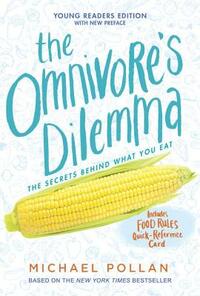Take a photo of a barcode or cover
medium-paced
After reading this I found myself paralyzed in the cracker aisle. Ended up going with bagels because I couldn't find a single cracker that didn't have some sort of corn in it.
Another book I feel nearly compelled to foist into the hands of everyone I know. Like Pollan's "In Defense of Food", this book will simply, and with wit and insight, change the way you eat and look at food.
In the 15 years that it took me to finally getting around to reading this one, much smarter people have spilled a lot more ink on this book's praise, analysis, critique, etc. -- so I'll keep mine short.
Pollan works "backward" from modern industrial agriculture, to "small-scale" and presumably "more natural" organic farming, and ultimately to the Paleolithic conceit of growing, hunting, and foraging an entire meal's worth of diverse foodstuffs. I suppose when this came out, it was significantly more revelatory, but it's my opinion that much of what's in here (especially with respect to the first section on industrialized agricultural) has largely made its way into the public consciousness -- but maybe that's just an artifact of me living in Vermont for the first big chunk of my adulthood. That being said, taking in the entire narrative and all of its detail feels a little overwhelming at certain points. Confronting the sheer magnitude of the food problems in the United States is daunting when viewed through the lens of global health and social equity.
It would be easy to say that the title winds up eliding some of the core messages, which is perhaps a bit unfortunate. If anything, I wind up closing the (virtual) cover here thinking less about any "Omnivore's Dilemma" and much more about food systems. His description of industrial agriculture in the United States leaves one feeling frustrated and (at least for me) somewhat nauseated at the intractable nature of producing "enough" food for this country -- and/but/so in large part because "enough food" is tied up in (1) a population convinced it should have a never-ending supply of "cheap meat" and (2) that there's so much money to be made in the process. But "organic" farming winds up not being much of an answer either because of how meaningless that term is; geographically localized food systems offer a glimmer of hope, but as I've learned in my own meal-planning and food-shopping over the last 20 years … "the good stuff" is more expensive, sometimes by mere margins, but often by quite a lot. (We'll put aside the third section about hunting and foraging because this clearly veers off into the realm of philosophy and frankly, to "nope out" of the national food system is a fantasy if you're engaged in real systems thinking.)
Systemic wheels turn slowly, and I'm hopeful that something more healthful and sustainable will emerge. For what it's worth, I'll be doubling down on "my part" but it's hard not to feel powerless and frustrated.
Pollan works "backward" from modern industrial agriculture, to "small-scale" and presumably "more natural" organic farming, and ultimately to the Paleolithic conceit of growing, hunting, and foraging an entire meal's worth of diverse foodstuffs. I suppose when this came out, it was significantly more revelatory, but it's my opinion that much of what's in here (especially with respect to the first section on industrialized agricultural) has largely made its way into the public consciousness -- but maybe that's just an artifact of me living in Vermont for the first big chunk of my adulthood. That being said, taking in the entire narrative and all of its detail feels a little overwhelming at certain points. Confronting the sheer magnitude of the food problems in the United States is daunting when viewed through the lens of global health and social equity.
It would be easy to say that the title winds up eliding some of the core messages, which is perhaps a bit unfortunate. If anything, I wind up closing the (virtual) cover here thinking less about any "Omnivore's Dilemma" and much more about food systems. His description of industrial agriculture in the United States leaves one feeling frustrated and (at least for me) somewhat nauseated at the intractable nature of producing "enough" food for this country -- and/but/so in large part because "enough food" is tied up in (1) a population convinced it should have a never-ending supply of "cheap meat" and (2) that there's so much money to be made in the process. But "organic" farming winds up not being much of an answer either because of how meaningless that term is; geographically localized food systems offer a glimmer of hope, but as I've learned in my own meal-planning and food-shopping over the last 20 years … "the good stuff" is more expensive, sometimes by mere margins, but often by quite a lot. (We'll put aside the third section about hunting and foraging because this clearly veers off into the realm of philosophy and frankly, to "nope out" of the national food system is a fantasy if you're engaged in real systems thinking.)
Systemic wheels turn slowly, and I'm hopeful that something more healthful and sustainable will emerge. For what it's worth, I'll be doubling down on "my part" but it's hard not to feel powerless and frustrated.
This is a phenomenally well-written and researched book that will completely change the way you see your food and where it comes from. Although I was a bit late jumping on the train (it was published over 8 years ago), I still got so many great, relevant resources from this book that I plan to use to change the way I contribute to the food economy. This is a must-read for anyone who wishes to be a conscious consumer.
challenging
informative
reflective
slow-paced
"Reminding that however we choose to feed ourselves, we eat by the grace of nature, not industry, and what we're eating is never anything more or less than the body of the world."
Due to time constraints and prior obligations, it took me much longer than it would normally would to read this 400 page book. Nevertheless, I enjoyed the ride. Although their was slow parts mainly due to the subject matter, the book was engaging for the most part partly due to Pollan's writing. The book was not simply concerned with topic of the modern food industry but also discussed humanity's relation to nature in terms of food. It was well written piece that did not simply lambast the results of the industrial revolution but a reverence of the act of sharing a meal and the input that goes into a meal. Did it change my eating habits? No, but that doesn't make it any less compelling. The book left me to ponder about not where my food comes from, but does food and the act of eating mean. Is it any act of grace, love, community? So much meaning can be ascribed to a simple bowel of rice. I will read more of Pollan's work and hope I leave the better for it.
Due to time constraints and prior obligations, it took me much longer than it would normally would to read this 400 page book. Nevertheless, I enjoyed the ride. Although their was slow parts mainly due to the subject matter, the book was engaging for the most part partly due to Pollan's writing. The book was not simply concerned with topic of the modern food industry but also discussed humanity's relation to nature in terms of food. It was well written piece that did not simply lambast the results of the industrial revolution but a reverence of the act of sharing a meal and the input that goes into a meal. Did it change my eating habits? No, but that doesn't make it any less compelling. The book left me to ponder about not where my food comes from, but does food and the act of eating mean. Is it any act of grace, love, community? So much meaning can be ascribed to a simple bowel of rice. I will read more of Pollan's work and hope I leave the better for it.
Such an excellent book! I feel so much more enlightened for having read it. Pollan is an entertaining and engaging writer and this book is extremely thought-provoking. The book is well-organized into the stories of three food types (industrial, sustainable, and pastoral) and Pollan's personal anecdotes are captivating. I love that he presents the subject without either condemning industrial food or trying to shove vegetarianism down your throat. He puts fair consideration to both sides and ultimately makes an argument for balance and awareness. He acknowledges that it is impossible not to consume industrial foods sometimes, but also impossible to be a hunter-gatherer all the time. We simply have to strive for sustainability in this modern age and trying to choose the best and healthiest option when possible. It's not just our personal health in question with these foods, but the health of the environment, the economy, and society. In the end, this book has inspired me to try harder to make good food decisions in an effort to better all these aspects, and it's also made me grateful to live in a place where sustainable farm products are so readily available and that I have already been making good choices (glad to be a CSA member!) I have always said that I could never be vegetarian - I love hamburgers too much - but now I know that it is perfectly reasonable to be an omnivore, as long as I take a few extra moments in the grocery store to choose the meat from happy cows and the bottle without high fructose corn syrup on the label.
This was book was interesting and informative without getting too dry. He investigates three different approaches to putting dinner on the table; commercial/industrial farming, local/sustainable farming and individual farming/foraging. Most of what is discussed are things we already have some awareness and understanding of, but, it's interesting just the same. Although I will say - I certainly look at my "pre-washed Spring Mix" in a different light!





